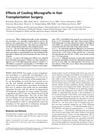182 citations,
November 2018 in “Cosmetics” Seaweeds have beneficial compounds for skin care, including anti-aging and protective effects.
 39 citations,
November 2021 in “Clinical Endocrinology”
39 citations,
November 2021 in “Clinical Endocrinology” Testosterone replacement is recommended for men with low testosterone levels and symptoms of hypogonadism.
[object Object] 33 citations,
October 2013 in “PloS one” Human sweat glands have a type of stem cell that can grow well and turn into different cell types.
 18 citations,
December 2021 in “Foods”
18 citations,
December 2021 in “Foods” Seaweeds contain beneficial compounds with potential uses in food, cosmetics, and health, but more research is needed to improve extraction and safety.
5 citations,
December 2023 in “Materials” Organic and biogenic nanocarriers can improve drug delivery but face challenges like consistency and safety.
 2 citations,
June 2023 in “Skin Research and Technology”
2 citations,
June 2023 in “Skin Research and Technology” Yellow dots and short vellus hairs are the most common signs of Alopecia Areata (AA), and trichoscopy can help diagnose AA and track treatment progress.
 1 citations,
September 2023 in “Molecules (Basel. Online)”
1 citations,
September 2023 in “Molecules (Basel. Online)” Plant sterols have health benefits like lowering cholesterol, but more research is needed to understand their effects and improve their extraction and sustainability.
 1 citations,
March 2023 in “Nutrients”
1 citations,
March 2023 in “Nutrients” The conclusion is that obesity should be managed with a slow, balanced approach to diet and exercise, with medication and surgery as additional options, and education and access to care are important.
April 2024 in “Surgical Techniques Development” The 11th AICPE Congress in Rimini was a major event in European aesthetic plastic surgery.
April 2024 in “International journal of molecular sciences” Light-based treatment, Photobiomodulation, shows promise for non-invasive skin therapy with few side effects.
 April 2023 in “Dentistry”
April 2023 in “Dentistry” Baby teeth stem cells can potentially grow organs and treat diseases.
 June 2023 in “Pharmaceuticals”
June 2023 in “Pharmaceuticals” Men and women respond differently to drugs for COVID-19, high cholesterol, and diabetes, which suggests a need for personalized treatments.
 53 citations,
June 1982 in “The BMJ”
53 citations,
June 1982 in “The BMJ” Cooling the scalp below 22°C before and during chemotherapy can help prevent hair loss.
 31 citations,
September 1999 in “Dermatologic Surgery”
31 citations,
September 1999 in “Dermatologic Surgery” Cooling hair micrografts during transplantation does not improve their survival or growth.
27 citations,
June 2011 in “Journal of Advanced Nursing” The penguin cap can help reduce hair loss in chemotherapy patients.
25 citations,
March 2018 in “Journal of oncology practice” Scalp cooling is an effective and safe way to prevent hair loss from chemotherapy, with manageable side effects and low risk of scalp cancer.
21 citations,
September 2016 in “Breast” Cooler scalp temperatures during chemotherapy may prevent hair loss.
 21 citations,
January 2015 in “Oncology Research and Treatment”
21 citations,
January 2015 in “Oncology Research and Treatment” Scalp cooling can prevent hair loss in 65% of chemotherapy patients, especially effective in breast cancer patients and certain chemotherapy types.
13 citations,
May 2016 in “British journal of nursing” Scalp cooling can help prevent hair loss from chemotherapy without raising cancer spread risk.
[object Object] 8 citations,
September 2015 in “Radiotherapy and oncology” Scalp cooling does not stop hair loss from radiotherapy.
4 citations,
January 2017 in “International Journal of Dermatology” Scalp cooling can help reduce hair loss during chemotherapy.
 4 citations,
April 2001 in “European journal of cancer”
4 citations,
April 2001 in “European journal of cancer” Scalp cooling prevented hair loss in half of the patients, despite significant side effects.
 3 citations,
May 2011 in “Medical Hypotheses”
3 citations,
May 2011 in “Medical Hypotheses” Transnasal cooling could reveal new insights into various physiological conditions and may be a natural way to transfer heat from the brain.
 September 2024 in “Journal of the American Academy of Dermatology”
September 2024 in “Journal of the American Academy of Dermatology” Facebook groups play a crucial role in supporting and guiding patients on scalp cooling and hair loss during chemotherapy.
 June 2024 in “Journal of clinical oncology”
June 2024 in “Journal of clinical oncology” Scalp cooling can effectively prevent hair loss during chemotherapy, improving patients' quality of life.
 March 2024 in “Research Square (Research Square)”
March 2024 in “Research Square (Research Square)” Scalp cooling therapy helps preserve hair during chemotherapy for most patients.
 January 2024 in “Dermatologic Surgery”
January 2024 in “Dermatologic Surgery” The device is useful for anesthesia, healing treatments, and preventing hair loss.
 November 2018 in “Annals of oncology”
November 2018 in “Annals of oncology” A scalp-cooling system effectively prevents hair loss in breast cancer patients treated with eribulin.
November 2017 in “Expert review of quality of life in cancer care” Scalp cooling can help prevent or reduce hair loss from chemotherapy.
 December 2017 in “Actas Dermo-Sifiliográficas”
December 2017 in “Actas Dermo-Sifiliográficas” Scalp cooling reduces chemotherapy-induced hair loss without increasing risk of skin metastases.

















